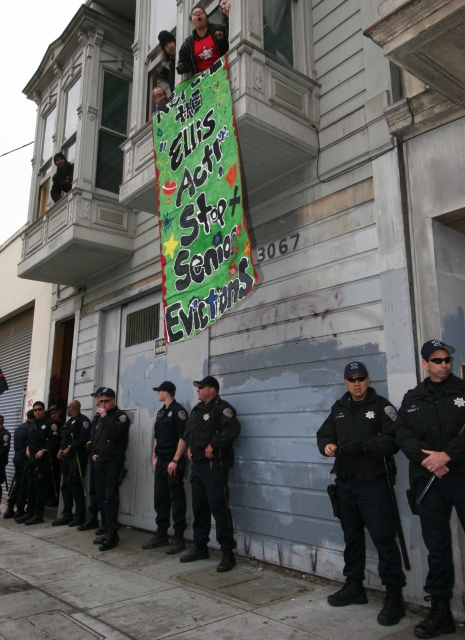From the Open-Publishing Calendar
From the Open-Publishing Newswire
Indybay Feature
Rent is Theft, Housing is a Human Right
The housing situation in San Francisco is a prime example of the greatest evil of capitalism. Only those who
can afford it get to be housed. Everyone
else lives on the streets. They get trash
talked by neighbors and politicians alike
for the sin of being homeless. They are
arrested or cited with “quality of life” citations.
The situation couldn’t be worse—unless you throw into the mix the fact
that landlords in San Francisco have the
ultimate weapon against tenants they
want to get rid of: The Ellis Act. Even
with all of the tenant protections, renters have in a “progressive” enclave such
as San Francisco, one can be tossed out
into a housing market where rents are
astronomical, just because some speculator wants to turn a building into over-
priced tenancies-in-common (TICs,
pronounced like the bloodsucking critter).
Various solutions have been proposed
for the housing crisis in San Francisco.
Most of these options involve band-aiding a system that is problematic to
begin with. Real change will only come
by changing how we do housing in
America. That means housing can no
longer be a commodity. As long as it is,
there will be a basic inequity: those who
can afford to rent or buy versus those
who can’t. Housing is a basic human
need and should be guaranteed, just as
healthcare is in many countries.
In the meantime before we get to
that point, however, there are things
that affordable housing advocates in
San Francisco can fight for. They’re still
band-aids on a sick system, but they
will give working-class and poor people
more of a chance at affording to live
here. They include:
1) A moratorium on market-rate
housing. The last thing San Francisco
needs is more housing for the rich.
2) A moratorium on condo conversions. Every condo that is converted
from the rent-controlled stock is the loss
of a unit that’s price is controlled while
the tenant lives there—not to mention
displaces a person paying low rent.
3) Vacancy control, which puts price
restrictions on a unit after the tenant moves out. Under vacancy control,
a landlord can only jack up the rent a
small percentage for the next tenant.
Right now, it’s prohibited by state law
(Costa-Hawkins).
4) Community land trusts. The land
is purchased by a nonprofit entity and
taken off the market forever. The tenants who live there either rent or purchase at 30 percent of their income. It
is similar to a co-op, only there is no
equity in a land trust.
5) Squatter’s rights. If a building is
vacant, why can’t people make use of it?
A radical, southern Italian, working-class queer, Tommi Avicolli Mecca works
by day for the Housing Rights Committee
of SF, a tenant’s rights organization.
For more information:
http://indybay.org/faultlines
Add Your Comments
Latest Comments
Listed below are the latest comments about this post.
These comments are submitted anonymously by website visitors.
TITLE
AUTHOR
DATE
To Confused
Wed, Aug 3, 2011 12:11PM
Thank you
Thu, Dec 10, 2009 12:05PM
The slacker argument
Sun, Apr 26, 2009 10:31PM
Rent is connected to capitalism-- both bad
Wed, Dec 5, 2007 1:10PM
scuse me
Wed, Dec 5, 2007 12:50PM
Everyone else lives on the streets?
Sun, Dec 2, 2007 8:40PM
Activist
Fri, Sep 21, 2007 5:12PM
Squatting is a great way to fight back and help the working class reclaim the commons
Sat, Jun 30, 2007 6:45PM
We are 100% volunteer and depend on your participation to sustain our efforts!
Get Involved
If you'd like to help with maintaining or developing the website, contact us.
Publish
Publish your stories and upcoming events on Indybay.
Topics
More
Search Indybay's Archives
Advanced Search
►
▼
IMC Network



